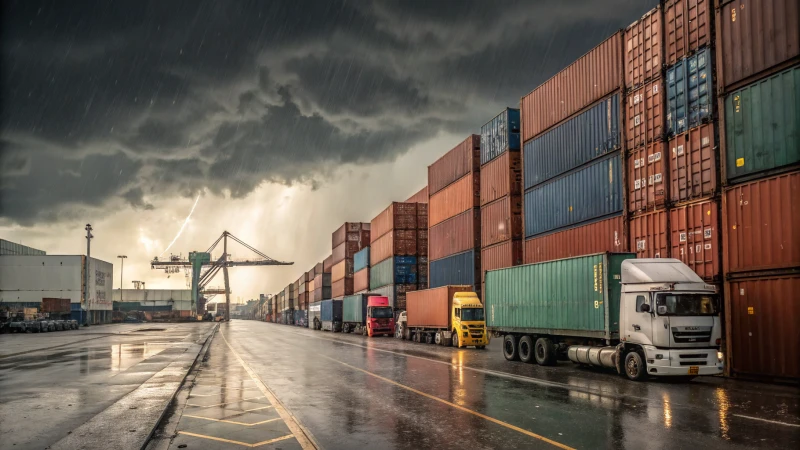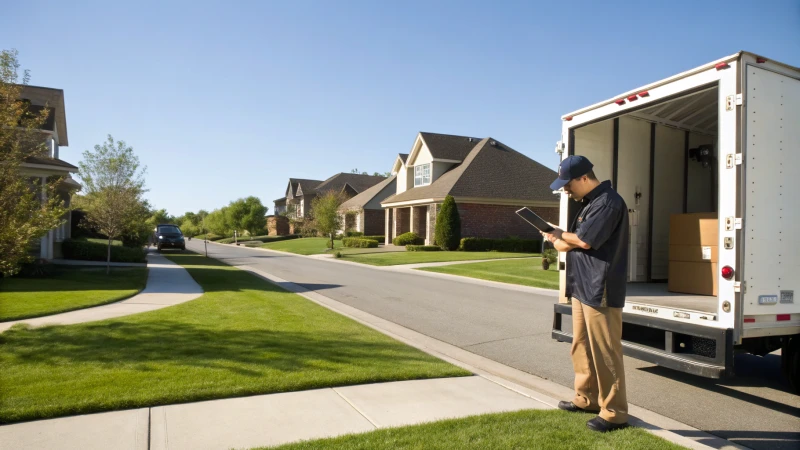Have you ever eagerly awaited a package, only to feel that sinking disappointment when it doesn’t arrive on time?
Amazon package delays often stem from issues with shipping carriers, incorrect addresses, or customs delays for international orders. These factors can disrupt delivery schedules, leading to frustration. By understanding these common causes, you can take proactive measures to help ensure timely deliveries.
I remember the time when I ordered a birthday gift for a friend, only to find myself anxiously tracking its whereabouts. As days passed without any update, I started diving into the reasons behind these delays. That's when I realized that knowing what might be causing the delay could actually empower me to handle such situations better in the future. Here’s what I discovered: understanding these potential roadblocks not only eases the frustration but also equips you with strategies to ensure your orders arrive as expected. Stick around, and I'll share what I've learned about keeping those Amazon deliveries on track.
Amazon package delays are always due to weather issues.False
Delays can also result from carrier issues, incorrect addresses, or customs.
Incorrect addresses can cause Amazon package delays.True
Providing wrong delivery details can lead to delayed or failed deliveries.
What Are Common Reasons for Shipping Carrier Delays?
Ever wonder why your package seems to be taking the scenic route? Shipping delays can feel like a never-ending wait.
Shipping carrier delays often stem from weather disruptions, high shipment volumes, logistical hiccups, and unforeseen events. By understanding these factors, we can better manage expectations and logistics planning.

I still remember the first time I faced a major shipping delay. It was the middle of December, right when everyone was scrambling to get their holiday gifts delivered on time. I watched my package's tracking status change from "on time" to "delayed," and it felt like I was stuck in limbo. Since then, I've learned a lot about what causes these delays.
Weather Conditions
One winter, I had a shipment caught in a snowstorm that grounded all flights. The entire transportation network seemed to come to a standstill. Now, I always keep an eye on weather forecasts1 to anticipate such issues.
High Volume Periods
Peak seasons like Black Friday are notorious for causing delays. I once waited nearly two weeks for a package that normally would've arrived in three days! Knowing these peak times helps me plan shipments more strategically.
| Peak Season | Impact |
|---|---|
| Black Friday | Increased demand, slower processing |
| Christmas | High volume, potential for backlog |
Logistical Challenges
It's surprising how often mislabeling or routing errors happen. Early in my business journey, a mislabeled package ended up halfway across the country. Now, I've implemented quality control measures2 to minimize such mishaps.
External Factors
Unpredictable events, like the pandemic or political unrest, can severely disrupt logistics. Staying informed helps me pivot quickly when such disruptions occur.
Customs and Regulations
When shipping internationally, customs checks can be a hurdle. I learned the hard way that incorrect paperwork can stall a shipment indefinitely. Ensuring all documentation3 is accurate is now a top priority.
Carrier-Specific Issues
Sometimes, it's just bad luck with the carrier's internal issues. Regular communication with them helps me stay updated on any potential delays.
Keeping customers informed about potential delays and setting realistic expectations is key. I've found that transparency not only helps maintain trust but also enhances customer loyalty.
Weather conditions are the main cause of shipping delays.True
Severe weather can disrupt transportation networks, affecting shipping.
High volume periods never affect shipping times.False
Peak seasons like holidays can overwhelm carriers, causing delays.
How Do Address Issues Impact Package Delivery?
Ever had a package delayed because the address was off? It's more common than you'd think, and it can be a real headache.
Address issues in package delivery, like incorrect or incomplete addresses, can cause delays, extra costs, and unhappy customers. Using address validation systems helps fix these problems efficiently.

Common Address Problems Impacting Deliveries
Picture this: you order something special, eagerly tracking its journey, only to have it stuck somewhere due to a tiny error in the address. It happened to me once when I was expecting a birthday gift for a friend—"123 Maple St, Apt 4B" mistakenly became just "123 Maple St." With no apartment number, the courier was stumped. Address verification4 tools could have easily prevented this hassle by catching such slip-ups before shipping.
Financial and Customer Service Implications
When packages are delayed because of address snafus, businesses end up shouldering increased costs. I've seen companies scramble to juggle labor and fuel expenses for re-delivery attempts while their customer service lines light up with frustrated calls. For businesses like e-commerce platforms, this isn't just about dollars and cents; it's about maintaining trust. Imagine your favorite store constantly messing up your orders—chances are, you'd shop elsewhere. Implementing a robust address management system5 could save the day by streamlining shipments and keeping customers happy.
Address Validation Techniques
So how do we dodge these headaches? Address validation is the way to go. By incorporating validation software into checkout processes, businesses can ensure addresses are spot-on before shipping. This not only nips errors in the bud but also saves time for everyone involved. A standout solution is geocoding technology6, which translates addresses into precise map coordinates for accurate delivery routes, making sure packages land exactly where they should.
Table: Address Validation Tools Comparison
| Tool Name | Key Features | Pricing |
|---|---|---|
| Tool A | Real-time validation, batch processing | Subscription |
| Tool B | API integration, international address support | Pay-per-use |
| Tool C | Geocoding, error correction | Free trial |
Adopting these systems isn't just about keeping deliveries on track; it's about enhancing customer satisfaction by reducing delays and mistakes. As logistics continue to evolve, integrating such technologies is becoming essential for businesses across the globe.
Incorrect addresses cause delivery delays.True
Wrong street names or postal codes lead to failed delivery attempts.
Address validation tools increase delivery costs.False
They reduce errors and re-delivery attempts, saving costs.
What Should I Do If My Package Is Stuck in Customs?
Ever had that moment of dread when you realize your package is stuck in customs? I've been there, and I know how unsettling it can feel. Let's explore how to navigate this sticky situation.
When your package is stuck in customs, start by checking its tracking status. Contact the shipping carrier for details, ensure all documentation is correct, pay any required duties, and consider hiring a customs broker to help you out.

Check the Tracking Status
First things first—check the tracking status of your package. I remember anxiously refreshing the carrier’s website, hoping for an update. Most shipping carriers7 offer real-time tracking that might hint if your package is held up at customs.
Contact the Shipping Carrier
If the tracking info leaves you in the dark, reach out to the shipping carrier. They can offer insights into why your package might be delayed and what steps you can take. It's like having a lifeline when you're lost at sea!
| Carrier | Contact Method | Average Response Time |
|---|---|---|
| FedEx | Phone, Email | 1-2 days |
| DHL | Online Chat | Same day |
| UPS | Phone | 1 day |
Verify Documentation
I once learned the hard way how crucial correct paperwork is. Double-check that all your documents are accurate and complete. Missing details can grind customs processing to a halt.
- Commercial Invoice: This needs to match the shipment details perfectly.
- Packing List: It should detail every item in your shipment.
- Certificate of Origin: Sometimes required to prove where your goods come from.
Pay Any Required Duties
Customs duties can sneak up on you! Make sure any applicable duties are paid promptly to avoid further delays. I’ve found it helpful to keep tabs with my customs authority8 for specifics.
Consider Hiring a Customs Broker
If things get too tangled, a customs broker can be a lifesaver. They know the ins and outs of customs procedures and can help smooth out the process when it's all Greek to me.
Learn About Customs Procedures
I’ve discovered that understanding customs procedures can be a game-changer for future shipments. Researching common customs procedures9 in your destination country can save you a ton of headaches later on.
By tackling these steps one by one, I've managed to resolve my customs issues more effectively. Services from Freight forwarders10 like Gofreighter have been invaluable in simplifying my international shipping woes.
Contacting the shipping carrier can resolve customs delays.True
Carriers provide insights and guidance for resolving customs issues.
A customs broker is unnecessary for complex shipments.False
Customs brokers offer expertise in navigating complex customs procedures.
How Do Pandemics Like COVID-19 Affect Delivery Times?
Ever found yourself waiting impatiently for a package, wondering why it's taking forever to arrive?
Yes, external factors like pandemics can drastically affect delivery times by disrupting supply chains, limiting workforce availability, and escalating demand for certain goods, forcing logistics to adapt quickly.
Impact on Supply Chains
I remember the early days of the COVID-19 pandemic when getting a simple package felt like a monumental task. Factories around the world were shutting down left and right, and it was like watching dominoes fall as shortages and delays became the new normal. This made me realize how interconnected everything is—from the raw materials needed to create products to their final delivery. Diversifying suppliers11 became essential to mitigate these risks, a lesson I learned the hard way.
Workforce Limitations
The pandemic also taught me about the importance of workforce availability. With social distancing and quarantine measures in place, many companies faced significant manpower shortages. It reminded me of when I had to manage a project with half my team unavailable—it was tough, but automation12 became our saving grace. Exploring automation solutions in logistics can keep things running smoothly even when human resources are limited.
Increased Demand for Essential Goods
I’ll never forget the mad rush for essentials like masks and sanitizers during the pandemic. The surge in demand strained logistics networks to their limits. It was a wake-up call to prioritize shipments and optimize routes. Implementing advanced logistics software13 became crucial in keeping operations efficient and response times quick.
Case Study: COVID-19 Pandemic
The COVID-19 pandemic was indeed a crash course in crisis management for logistics. As shipping routes were disrupted globally, I watched companies that swiftly adapted by diversifying their transportation modes and leveraging technology fare much better than those that didn’t. This experience taught me valuable crisis management strategies14 in logistics that I continue to apply.
| Challenge | Solution |
|---|---|
| Factory shutdowns | Diversify supplier base |
| Workforce shortages | Automate processes |
| Demand surges | Optimize shipping routes |
| Route disruptions | Utilize multiple transportation modes |
Understanding these challenges helps me prepare for unforeseen disruptions. By adopting innovative solutions and flexible strategies, I can minimize the impact of external factors like pandemics on delivery times and maintain resilience in my operations.
Pandemics halt production and close borders.True
Pandemics disrupt supply chains, causing factory shutdowns and border closures.
Automation can't help during pandemics.False
Automation maintains efficiency with reduced workforce during pandemics.
How Can I Contact Amazon for Further Assistance?
Ever felt lost trying to contact Amazon? I’ve been there, and it can be frustrating. Let me guide you through the most effective ways to reach out to them and get the help you need.
To contact Amazon for assistance, I usually head straight to the Contact Us page on their website. It’s a lifesaver with options like live chat, call-back requests, and email. Just log into your account, go to Help, and then Contact Us.

Navigating the Amazon Help Page
I remember the first time I had an issue with an Amazon order—it was a mix-up with a birthday gift. Luckily, the Amazon Help page15 was my go-to. Logging into your account and navigating to 'Help' > 'Contact Us' presents several options to resolve any hiccups.
| Contact Method | Description |
|---|---|
| Live Chat | Available 24/7, ideal for immediate text-based support. |
| Call-Back Request | Leave your number and get a call from Amazon support. |
| Submit a detailed query and receive a response via email. |
Using the Amazon Mobile App
There was this one time I was on the move, and my package seemed to be in limbo. The Amazon mobile app16 came in handy. By tapping the menu icon and heading to 'Customer Service', I easily accessed options like chat or call-back requests.
Social Media Channels
For those times when you feel like shouting from the rooftops (we’ve all been there), Amazon's social media channels, such as Twitter and Facebook, offer a way to voice public queries or feedback. Direct messaging often gets a swift reply.
Direct Phone Numbers
In certain regions, dialing direct phone numbers can be an option. Always a good idea to check Amazon's regional website or contact your local office17 for specifics.
When to Use Which Method
- Live Chat: This is my pick for quick questions or if writing is more your speed.
- Call-Back Request: Perfect for when things get complicated and a conversation is best.
- Email: Handy for non-urgent issues or when detailed documentation is needed.
Whatever method you choose, having your order details or account info at the ready can speed things along when contacting Amazon. And don’t forget to check out their FAQ section18 first—many common issues are tackled there. So, dive in, and may your customer service journey be swift and successful!
Amazon's live chat is available 24/7.True
Amazon provides 24/7 live chat support for immediate assistance.
Email is the fastest way to contact Amazon.False
Email is suitable for non-urgent issues, not the fastest option.
Conclusion
Amazon package delays can occur due to shipping carrier issues, incorrect addresses, customs processing, or external factors like pandemics. Understanding these causes helps manage expectations and improve delivery outcomes.
-
Check for updates on weather patterns that could impact shipping routes to anticipate possible delays. ↩
-
Discover methods to enhance your shipping process by minimizing errors and delays through effective quality control strategies. ↩
-
Learn about essential documentation needed to streamline customs procedures and prevent unnecessary shipping delays. ↩
-
Discover how address verification tools improve accuracy and prevent errors. ↩
-
Learn how address management systems streamline delivery processes. ↩
-
Explore how geocoding technology ensures precise deliveries. ↩
-
This link offers direct contact details for major carriers, helping you resolve customs issues quickly. ↩
-
Understanding duty payment procedures can expedite the release of your package from customs. ↩
-
This link provides insights into standard customs processes, aiding in smoother future shipments. ↩
-
Exploring this can help you understand how freight forwarders simplify complex shipping tasks. ↩
-
Diversifying suppliers reduces reliance on a single source, minimizing risk of supply chain disruptions. ↩
-
Automation compensates for reduced human labor, maintaining efficiency in logistics operations. ↩
-
Advanced logistics software enhances route planning, improving efficiency during high-demand periods. ↩
-
Crisis management strategies help businesses navigate disruptions, maintaining operational stability. ↩
-
Learn about all available contact methods provided by Amazon on their Help page. ↩
-
Explore how the Amazon mobile app facilitates easy access to customer support. ↩
-
Find specific phone numbers for Amazon customer service in your region. ↩
-
Visit the FAQ page for answers to frequently asked questions about Amazon services. ↩




